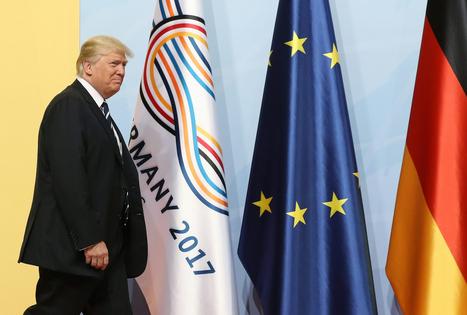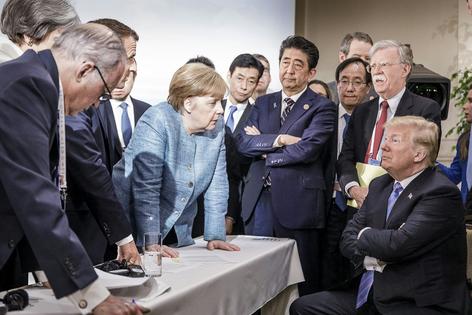Germany and US have long been allies - that could change with Trump
Published in Political News
Less than 24 hours after Donald Trump was elected president of the United States in November 2024, the German state-owned news service Deutsche Welle published an article with the headline “Trump’s election victory is a nightmare for Germany.”
A few hours later, Germany’s chancellor, Olaf Scholz, announced that his three-party political coalition had collapsed. Disagreements about how to help strengthen Germany’s weak economy were a major factor, but Scholz mentioned that the U.S. election outcome also fueled the coalition breaking up.
One month later, Scholz lost a confidence vote, ending the government he has led since 2021. Germany will have federal elections on Feb. 23, 2025.
Germany is considered one of the United States’ closest allies in Western Europe, partnering on everything from economic trade to military defense.
But this might change with Trump returning to office. As Angela Merkel, the longtime former chancellor of Germany, said in November 2024, the looming second Trump presidency “is a challenge to the world, especially for multilateralism.” Indeed, Trump’s U.S.-centric approach to international affairs runs counter to multilateralism, which is the idea that different countries working together helps everyone involved.
As someone who researches German-American relations in the 20th century, I share German politicians’ worries that the incoming Trump administration poses a serious threat to the relationship.
The German concerns include Trump potentially launching a tariff-induced trade war, as well as the possibility of the president-elect withdrawing financial and military support for Ukraine in its war against Russia. Both scenarios would further hurt the weak German economy – especially since, following the U.S. and the European Union, Germany is the third-largest donor to Ukraine and would be required to shoulder even more of this financial support if the U.S. stopped giving Ukraine money.
German politicians also remain dumbfounded by Trump’s particular style of politics, despite the fact that he already served as president.
Merkel wrote in her 2024 memoir “Freedom: Memoirs 1954-2021” that when she first met Trump in 2017, she acted as though she were having a conversation with “someone completely normal.” Merkel quickly realized, though, that Trump was not like other American politicians. She observed that Trump seemed to think all countries competed and the success of one meant the failure of another.
That was not the type of American president Merkel and other Germans were used to. Merkel was born in 1954, when Germany was split into two countries: communist, Soviet-aligned East Germany, where Merkel grew up, and capitalist West Germany, which was formed out of the three western sectors controlled by France, the U.S. and the United Kingdom at the end of World War II and was aligned with the U.S.
The U.S. embraced West Germany as an important ally shortly after the war. This alliance helped the U.S. make sure that Germany, not too long ago an enemy of the U.S. during World War II, would never again become a threat to world peace.
West Germany also served as an important front line in Europe as the U.S. navigated the Cold War with the Soviet Union starting in 1947.
West Germany, meanwhile, appreciated the power of having an American überpartner during the Cold War, especially since West Germany flourished economically during most of the conflict. East Germany’s economy, on the other hand, was relatively weak throughout the Cold War.
Perhaps the most visible symbol of Germany’s division was the Berlin Wall, a 96-mile partition that cut through Berlin. East German authorities built the wall in 1961 in order to prevent East Germans from fleeing to West Germany.
It was only after the Berlin Wall fell in November 1989, symbolizing the looming end of the Cold War that year and opening up the possibility for German unification, that Merkel entered politics.
As a politician in the 1990s, Merkel witnessed how then-President George H.W. Bush convinced France and the United Kingdom to put aside their fears about a new German dominance over Europe and allow their former World War II enemy to unify and gain full sovereignty.
The four main Allied powers of World War II in Europe – the United Kingdom, U.S., Soviet Union and France – had initially denied Germany the right to sovereignty after the end of the war.
But in 1990, the four Allies signed the Two Plus Four Treaty – an international agreement that allowed Germany to unify as a fully sovereign state in October 1990.
Immediately afterward, Bush praised the transatlantic alliance between the U.S. and Germany. The American president emphasized the two countries’ common “love of freedom” and expressed his hope that they become “partners in leadership.”
Bush’s words signaled an important turnaround in the international expectations of Germany, and the need for it to become a more influential political and military player in world politics. It was a turnaround, however, that many Germans did not necessarily welcome. Germans felt reluctant to step into the powerful leadership role that the U.S. expected of the country.
At the time, there was a common belief in Germany that military restraint had finally made their country a stable and prosperous one, following two devastating wars.
In fact, in almost all the global crises since 1990 – from the war in Bosnia in 1992 to Russia’s annexation of Crimea in 2014 – Germany has shown a reluctance to take the lead. Instead, Germany prefers a secondary role in navigating international conflicts, primarily through its membership with the military coalition NATO and the United Nations.
After Russia launched a full invasion of Ukraine in February 2022, Germany’s approach to international conflicts dramatically changed, and it finally stepped into the leadership role envisioned by Bush in 1990. In a historic speech on Feb. 27, 2022, Scholz called the attack a “Zeitenwende”, meaning “a watershed era” in German, and announced a significant increase in military spending.
The U.S. and other Western allies have welcomed this shift.
While NATO members had already agreed to invest a minimum of 2% of their gross domestic product in defense spending in 2006, Germany – like other European countries – did not meet this commitment for many years.
It was only in February 2024 that Germany finally achieved its 2% spending target for the first time in the wake of the ongoing Russian war against Ukraine.
That it did so was not just a result of that conflict.
Pressure by American presidents, above all Trump, also played a major role. Trump’s continuous threat throughout his first presidency to “pay your bills or we leave NATO” had apparently paid off.
It will be up to the new German government to remind Trump of the history of German-American relations and the many benefits of the transatlantic alliance between the two powers since 1945.
This article is republished from The Conversation, a nonprofit, independent news organization bringing you facts and trustworthy analysis to help you make sense of our complex world. It was written by: Sylvia Taschka, Wayne State University
Read more:
A far-right political group is gaining popularity in Germany – but so, too, are protests against it
On foreign policy, Trump opts for disruption and Harris for engagement − but they share some of the same concerns
Germany may be the biggest loser if it doesn’t start spending
Sylvia Taschka does not work for, consult, own shares in or receive funding from any company or organization that would benefit from this article, and has disclosed no relevant affiliations beyond their academic appointment.


































































Comments